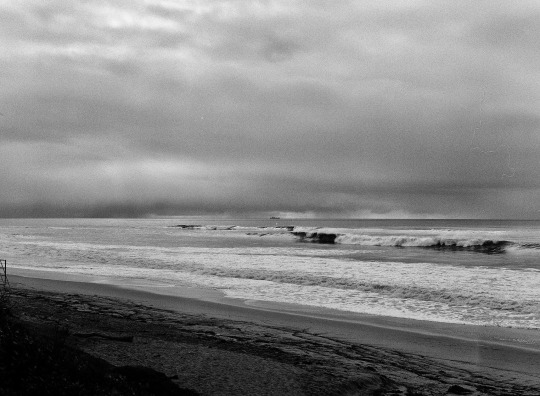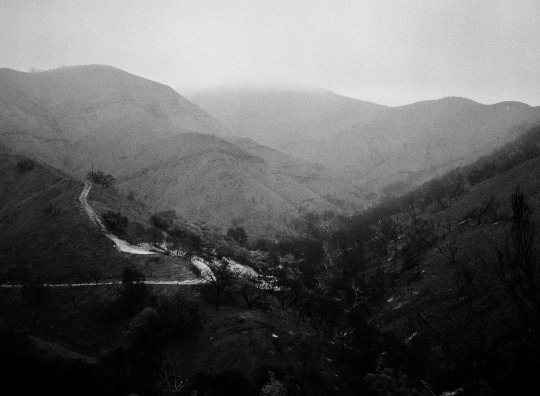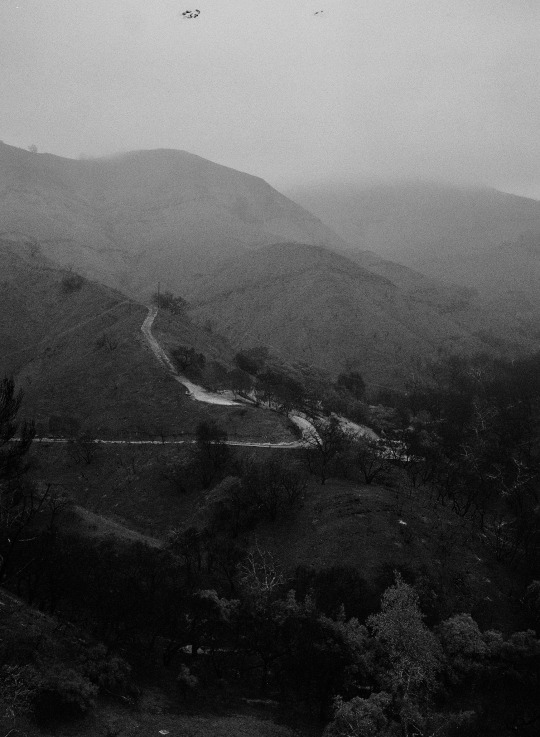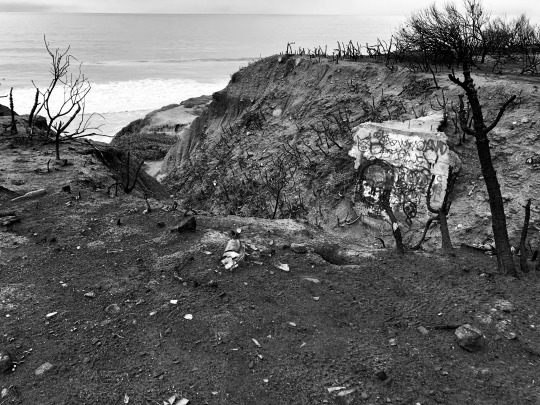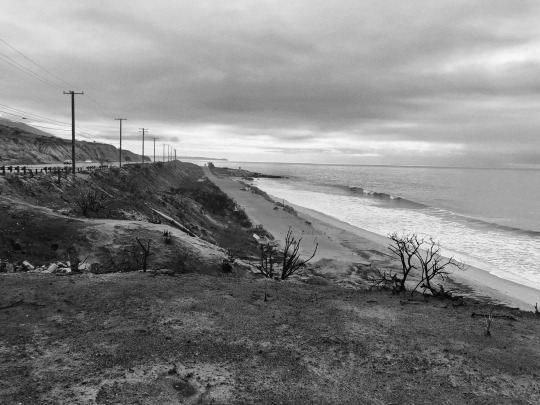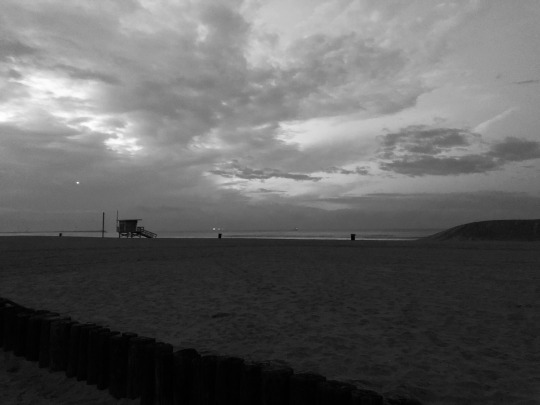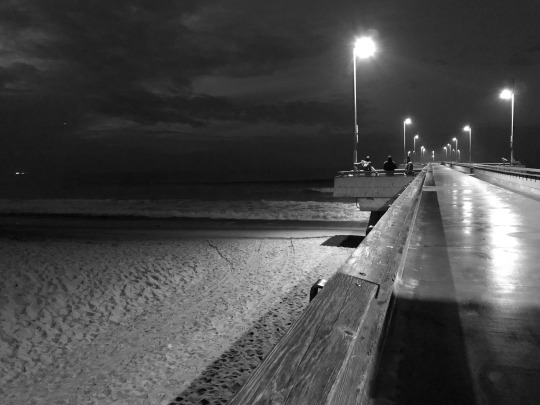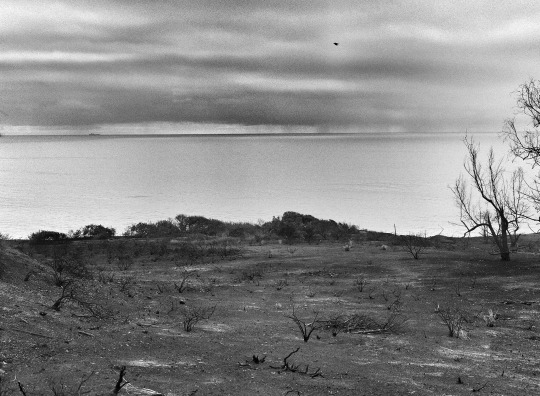#woolsey fire
Text
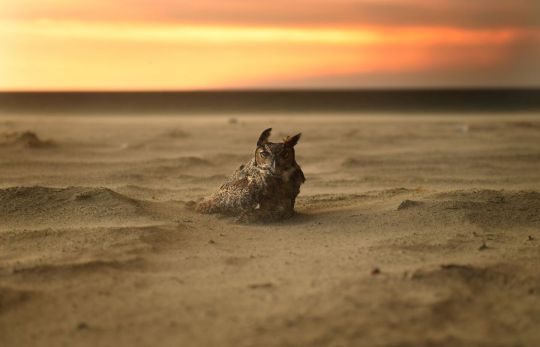
Nearly four years ago, a wildfire raged through Woolsey Canyon in Southern California, forcing people to flee from their homes, and I even remember a story about a woman named Laci Ping who reunited with her [minimally injured] house cat named Mayson after he fled from his own home while she and her family were evacuating. There were lots of stories like Mayson’s at the time, and I guess the animal angle really hit me in the feels because when I saw this photo posted by Wally Skalij for the Los Angeles Times of an owl resting on the beach, likely after a long journey away from the Woolsey fires, too, I had to repost it, wordlessly, just too sad about the state of their little corner of the world.
Sometimes these posts show up in my “memories” on Facebook, but this one has stuck out in my mind ever since then; it didn’t show up in my “memories” today, for instance. I can sense a stunned look in his eyes. I hope he’s OK wherever he is. I don’t wanna turn this post into a diatribe about how human beings generally suck, which they do, so I’ll leave it at that.
Anyway, I guess we’ve been lucky this season not to have too many wildfires because I haven’t seen any significant stories about disasters out on the west coast. Fingers crossed, eh?
#owl#owls#wildlife#wildfires#California#woolsey fire#Woolsey fires#photos#photography#animals#Wally skalij#Los Angeles times#laci ping#mayson#wildlife photography#beaches#woosley canyon#photojournalism#Southern California
0 notes
Text

Agoura Hills CA A
Photography by Matthew Brandt
Carbon Print with Ashes and Cinder collected from Woolsey Fire on Blackout Fabric, 2021
79 notes
·
View notes
Text
Atlantis Expedition: Science Division Departments
"Many of the scientists on Atlantis are organised into departments, each with their own department head. Dr. Rodney McKay was head of the Science and Research Division which most likely meant he was in charge of all of the science departments. Dr. Radek Zelenka was also the head of his own department. The various science departments on Atlantis are:
> Physics
» Astrophysics
> Biology
» Microbiology
» Astrobiology
> Oceanography
> Botany
> Medicine
> Anthropology
(SGA: "Remnants", "Grace Under Pressure", "Suspicion")"
From <https://stargate.fandom.com/wiki/Atlantis_expedition#Departments>
---
As I'm working my way through worldbuilding headcanons on the expedition, I figured I ought to start with the science division first. Above is my starting point: the canonical information at hand, to flesh out and give it some real-world reliability.
When I looked at it again, I realized it was, to put it politely, ill-thought-out crap that was only looked upon when the writers needed some random scientist around for episode material.
So, what considerations would an expedition like this actually need to take into account when hiring people?
At the very bare bones of it is "how many people can I fit through a wormhole in twenty or twenty-five minutes, plus supplies?". I went back and forth, prevaricated for a bit, and settled on 200 people if you really want to hoof it.
(Why 20-25 minutes? It's SGC's first stable-ish wormhole to another galaxy that's powered by a ZPM. They don't even know how much of a success that would be, or if they're just shoving people into a glorified shredder. Gotta pick and choose who you're maybe putting through the billion-dollar shredder. Y'know. Just in case.)
My initial rough estimations were about an even split between scientific and military personnel, which I kept on hand as napkin math to sanity check myself. This would be approximately 150 scientists.
What departments would there be, and how would it be divided? Who makes the priorities, and why?
The canon data is a mess, and as I worked through things, canon kept getting folded and refolded into different configurations because there's two competing priorities: the IOA/SGC, and Rodney's approach to pragmatism.
What was everyone expecting to see on the other side of that wormhole? Definitely not a city ship sunk into the ground of an ocean, and definitely not isolated from others (the Athosians were an unexpected godsend that kicked off the reason to have a plot in the first place). Whatever the IOA or SGC had in mind will quickly get thrown out the window, but needs must, and the departments were likely arranged long before the shipping manifest was decided.
I poked around the uniforms, because everyone is colour-coded, and there's five sections:
> Red (civilian, leader) - Worn by Dr. Elizabeth Weir, Teyla Emmagan, Colonel Samantha Carter and Richard Woolsey.
> Blue/dark blue or purple (scientist) - Worn by Dr. Meredith Rodney McKay and Dr. Radek Zelenka.
> Yellow (medical) - Worn by Dr. Carson Beckett and Dr. Jennifer Keller.
> Black (military) - Worn by Lt. Colonel John Sheppard and Major Evan Lorne.
> Green (technician) - Worn by Chuck and Amelia Banks.
This information is listed in both the "List of Atlantis personnel" and "Atlantis expedition uniform" pages on SGCommand.
Thus far that gets me two and a half departments in my hand: Scientist, Medical, and Technician (that's the half).
What would the SGC and IOA want the expedition to prioritize? Technology, and lots of it. This means that, probably, there's going to be more engineers than you can shake a stick at, and not a lot of pure sciences. Remember, it cost money to fire up the gate, and flinging people into another galaxy is an unfathomable amount of (international, at this point) taxpayer funds. You're going to want as much applied science as possible, and as much overlap in disciplines as possible.
(Unfortunately this does leave little room for error, so anyone that dies is capable of leaving a hole in potential research.)
Therefore, how would a top-down order of technological research look like? My assumption was this:
> Engineering of the city of Atlantis itself
» ZPMs, auxiliary and/or complementary power sources
» Materials and material manufacturing
» Design specs of different technologies (jumpers, yes, but also anti-grav, shields, climate controls)
> Biological sciences
» ATA gene therapies
» Whatever the Ancients were working on regarding ascension
⇛ Helpful with the Ori once Atlantis is informed of that issue
To wit, neither addendum on the biological sciences bullet point is pertinent at the time of department formation, as Carson invented the ATA gene therapy after arriving in Atlantis, and the Ori weren't an issue for a similar reason.
Ergo, all non-biological engineering fields would have had higher billing, and thus more of them hired. The only exception would be medical, and I'm sure the SGC had the forethought to bully the IOA into its relevancy and make sure that department was as fully-stocked as they could manage.
Now what about practical considerations? Plans are nice and all, but rarely survive contact with reality, so some adjustment might be needed. This, I believe, the SGC considered, given their own history of needing to rapidly adjust on the fly.
Rodney, as Chief Science Officer (CSO), would be the one to not only make these kinds of decisions, but also to listen to the head of the expedition as to what needed to be prioritized. As the show has demonstrated, there can be a significant amount of shuffling around of employees based on the needs of a minute, and hour, a week, a month - for an indefinite amount of time? Basics are what gets the job done.
So what things would Rodney need to consider, or be directed to consider by Elizabeth?
> Oh shit this can sink
» Rodney's main work - keeping the ZPM working and get as many new ones as possible
> Oh shit everything's so far away
» Rodney's other main work - making sure the gate works as ordered
> Oh shit we're in another galaxy
» Food
⇛ Getting, keeping, preserving, maybe the occasional growing
» Utilities
⇛ Luckily they don't have to pay for it lol
⇛ But also oh shit lighting, water, sewage, air filtration, general life support
⟹ Rodney's third main work
⟹ This poor guy
» Medicine
⇛ Rodney delegates the hell out of this
⇛ Good luck making potions, guys!
» Bullets
⇛ Also other things the military needs
⇛ Fun times re-inventing the wheel I mean gunpowder
⇛ Good work for bored soldiers, and possibly also any scientist Rodney puts in time-out
» Clothes
⇛ Ha, thread
⇛ Also needles
⇛ Experiments in sewing machine making
⟹ Watch the fingers
⇛ How to replace fabric?
⇛ Off-duty clothes
⇛ Also medical clothing (scrubs for staff, patients)
» Miscellaneous
⇛ Entertainment, I guess
Internal monologue included because I think it's funny.
Anyway.
While Rodney's spending his days with Benny Hill music playing in the background trying to get all of those priorities done on top of actually delegating work and doing whatever else Elizabeth (and John) want him to do, other people actually need to have some work to get done. So what are they doing?
It depends on who already does what, frankly. So in the above combined interests (amount of people that can fit through an intergalactic wormhole, competing IOA/SGC interests, realities of living in Atlantis), I'm proposing this set-up (commentary included):
Medical Sciences Department
Head: Carson Beckett (later, Jennifer Keller, later, whomever)
Contains: Surgery, psychiatry, physical therapy
Function: Maintaining health of expedition members
Examples of function: surgeries, medical prescriptions, recuperation from injuries, mental stability
Personnel quantity: 1 (Head) + 10 (surgical team) + 5 (nurses) + 1 (psych) + 1 (phys. therapy) + 1 (anesthesiologist) = 19 total
A/N: Nurses have training in medications and physical therapy, surgical team also doubles as general practitioners.
Life Sciences Department
Head: OC
Contains: Earth biologists, bio- & biochemical engineers, astro/xeno-biologists, botany, environmental chemistry, zoology, microbiology
Function: Auxiliary to Medical Department needs
Examples of function: pharmaceutical synthesis, analysis of unknown species, biological database creation, gene therapies (pharmaceutical adjacent)
Personnel quantity: 1 (Head) + 2 (Earth biologists) + 2 (bioE & biochemE) + 1 (astro/xenobio) + 1 (botany) + 1 (envchem) + 1 (zoo) + 2 (microbio) = 11
A/N: Both biologists also have training/specialization in genetics/gene mapping (assists both Carson and Katie), some input in requesting gate missions based on in-house needs.
Field Sciences Department
Head: OC
Contains: Linguistics, historical geography, cartography, ethnography, sociology, oceanography, hydrology, atmospheric physics, planetary physics
Function: Research pool for gate teams and any assigned missions
Examples of function: Preservation of refugee cultures, scouting for trade planets, analysis of back-up sites for establishment
Personnel quantity: 1 (Head) + 3 (linguistics) + 1 (histgeo) + 1 (cart) + 1 (ethno) + 1 (socio) + 1 (oceano) + 1 (hydro) + 1 (atmophys) + 1 (planphys) = 12
A/N: SGC duplicate all shoved into one department, mostly ignored in-house but their brains are picked for background dossiers when it comes to mission planning. Linguists trained in xenolinguistics, from the SGC, can cover the various anthro fields if necessary, also various training in structural linguistics. Main scientist pulls for gate team assignments, if something critical isn't needed (i.e. Ancient technology).
Applied Sciences Department
Head: Rodney McKay (or perhaps Radek Zelenka?)
Contains: Electrical/technical engineering, nuclear physics, civil engineering, astrophysics, laser/optical, chemical engineering
Function: Study, synthesis, and adaptations of Ancient technology
Examples of function: ZPM analysis with intent to duplicate, experimental duplications of Ancient technology materials, study of gate physics and construction with intent to duplicate, study and experimental duplication of other Ancient technologies (i.e. hyperdrives, cloaks, weapons, etc)
Personnel quantity: 1 (Head) + 3 (electreng) + 6 (techeng/gate techs) + 1 (nucphys) + 1 (astrophy) + 1 (LZ/opt) + 3 (chemeng) = 16
A/N: The people Rodney are yelling at most often, because mistakes mean kablooey. Also a lot of the people running around in an emergency. 1 nuclear physicist because Rodney pulls a lot of intellectual weight, and same with the astrophysicist and laser/optical person (mostly they're there as on-paper hires and back-ups/assistants for him for his own research).
Gate Technicians
Head: ??? Joint custody
Contains: Gate technicians
Functions: Auxiliary to Applied Sciences Department, interacts with the gate and the gate only
Examples of function: dialing, searching database for addresses, maintaining mission logs and planets visited, basic repair and maintenance of the gate, technical drawings as required by others
Personnel quantity: Chuck, idk +5 for full shift overlaps = 6 total (listed in Applied Sciences department as techeng/gate techs)
A/N: Technically nerds but are active duty, probably loans from SGC (maybe also Russia because of the DHD debacle?).
Gate technicians are, although folded into the Applied Sciences department, listed separately in order to better articulate their duties (and the fact that they get the green shirts). Shout-out to @spurious for enabling the idea that gate techs would do technical drawings 😁
Sum Total of Science Division Personnel
Medical: 19
Life Sciences: 11
Field Sciences: 12
Applied Sciences: 16
Total total: 19 + 11 + 12 + 16 = 58
This isn't anywhere close to my initial estimate of 150, but I think it adequately covers all the preconceived and actual responsibilities that the science division would need to handle in the expedition. Possibly I might update these numbers as I develop this headcanon further, but that would end up in a new post.
Further elaboration on headcanons about each department will be in their own posts, with links updated here as they're posted for ease of reference.
Science Department Breakdown Posts
Medical Department (posted 14 May 2024)
Life Sciences Department (posted 29 May 2024)
Field Sciences Department (posted 30 May 2024)
30 notes
·
View notes
Text
Alec Lightwood
"You never called me back," he said. "I called you so many times and you never called me back." Magnus looked at Alec as if he'd lost his mind. "Your city is under attack," he said. "The wards have broken, and the streets are full of demons. And you want to know why I haven't called you?"
- City of Glass
"Good organization," said Magnus. “I knew the man who founded it, back in the 1800s. Woolsey Scot. Respectable old werewolf family.” Alec made an ugly sound in the back of his throat. “Did you sleep with him, too?” Magnus’s cat eyes widened. "Alexander!"
- City Of Fallen Angels
Alec looked merely irritated by this comment. "The only way you could raise enough money to hire Magnus by selling lemonade is if you put meth in it."
- City of Lost Souls
"Alec," Magnus said. He put a hand on his boyfriend’s shoulder; Alec was standing still, staring angrily at the floor. "Are you okay?" Alec looked at him. "Who are you again?" Magnus gave a little gasp; he looked — for the first time Simon could remember — actually unnerved. It lasted only a moment, but it was there. "Alexander," he said. "Too soon to joke about the happy memory thing, I take it," Alec said.
- City of Lost Souls
"I did not make a pie,” Alec repeated, gesturing expressively with one hand, “for three reasons. One, because I do not have any pie ingredients. Two, because I don’t actually know how to make a pie.” He paused, clearly waiting. Removing his sword and leaning it against the cave wall, Jace said warily, “And three?” “Because I am not your bitch,” Alec said, clearly pleased with himself.
- City of Heavenly Fire
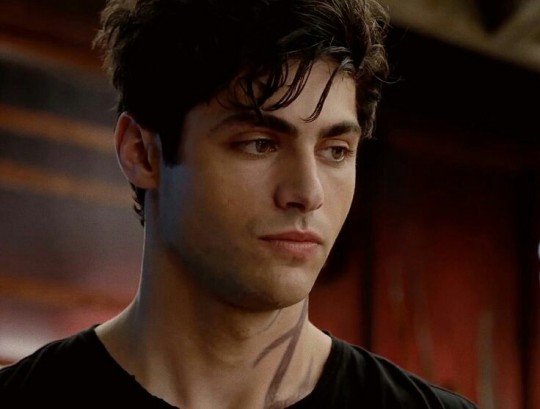



#Alec lightwood#Magnus bane#Alexander lightwood#Jace herondale#Clary Fairchild#City of Fallen Angels#City of lost souls#City of Heavenly Fire#The dark artifices#The infernal devices#The mortal instruments#Aesthetic#Secrets of blackthorn hall#Ghosts of the Shadow market#Tales from the Shadowhunter academy#Cassandra clare#Quotes#Petty#Will herondale#Kieran kingson#Taylor swift#Gorgeous
150 notes
·
View notes
Text
Example Submitted Post
No more kids with cancer: Clean up the Santa Susana Field Lab
youtube
Video: A Change.org-made feature video explaining the situation and the story of the organization's founder, whose daughter got cancer.
From the organizers:
"Sign to demand that California's EPA and the Dept. of Toxic Substances Control (DTSC) enforce the AOC cleanup of the Santa Susana Field Lab and prevent any more children from getting cancer...
My daughter’s childhood was stolen from her, and it haunts me to know her cancer might have been avoidable.
She, like [dozens of other] children, grew up within 20 miles the Santa Susana Field Lab, land which was developed in the 1940s to conduct rocket engine tests and secret nuclear research. In 1959 an uncontained partial meltdown of a sodium reactor caused such a devastating radiation leak that many consider it to be the worst nuclear disaster in U.S. history – and it was completely covered up for years.
Our community has up to 60% higher cancer rates, 20% higher invasive breast cancer rates, and we have the reports to prove it. It is the Department of Toxic Substance Control’s job to clean up this mess. They know our children are sick and dying, but they aren’t taking any meaningful action against those who own the land – Boeing, NASA and the Department of Energy.
The Woolsey Fire, which began on Santa Susana Field Lab, may have exposed millions of people in Southern California to the chemical and radioactive waste from the site, via ash and smoke. It proved once again that we will not be safe until the site is 100% cleaned up."
--
Info
Action Type: Petition
Source organization: Parents Against Santa Susanna Field Laboratory
Where: Southern California, specifically western Los Angeles, the San Fernando Valley, Simi Valley, Thousand Oaks, Chatsworth, and anything between those areas.
In person or virtual: Virtual. You can sign from anywhere, especially in the United States.
Time/date range: Petition started in 2017, ongoing, because Boeing is refusing to comply with the required cleanup plan they signed.
Here's the link again!
Anything else: This nuclear meltdown is the reason my grandfather died young of cancer. It's the reason 6+ members of my family are at lifelong elevated cancer risk, me included.
Everyone who has lived in this region, which includes a large area of Los Angeles, needs elevated levels of cancer screenings, especially for children, yet basically no one knows that.
(More on this here, if you're from any of the cities I listed PLEASE look into this and talk to your doctor about increased cancer screenings asap!)
#cw cancer#yes that part at the end is for real something that happened to me and my family#discovering this is actually what gave me the kick I needed to finally stop mulling and start this sideblog#submission#my grandfather died of cancer as a result of this nuclear meltdown#and it's possibly/probably the reason that my grandmother and my uncle got cancer as well#though my grandmother died of something else and my uncle is fragile but (miraculously given his form of cancer) still alive#over a decade before I was born#nuclear#anti nuclear#california#los angeles#united states#nuclear reactor#radiation#simi valley#thousand oaks#direct action#petition#ways to help#Youtube#blog business#me#submit a post
17 notes
·
View notes
Text
As the effects of climate change become impossible to ignore, the crueler side of the denial project—now lurking as subtext—will become explicit. It has already begun. At the end of August 2011, with large parts of the world still suffering under record high temperatures, the conservative blogger Jim Geraghty published a piece in The Philadelphia Inquirer arguing that climate change “will help the U.S. economy in several ways and enhance, not diminish, the United States’ geopolitical power.” He explained that since climate change will be hardest on developing countries, “many potentially threatening states will find themselves in much more dire circumstances.” And this, he stressed, was a good thing: “Rather than our doom, climate change could be the centerpiece of ensuring a second consecutive American Century.” Got that? Since people who scare Americans are unlucky enough to live in poor, hot places, climate change will cook them, leaving the United States to rise like a phoenix from the flames of global warming.
Expect more of this monstrousness. As the world warms, the ideology so threatened by climate science—the one that tells us it’s everyone for themselves, that victims deserve their fate, that we can master nature—will take us to a very cold place indeed. And it will only get colder, as theories of racial superiority, barely under the surface in parts of the denial movement, make a raging comeback. In the grossly unequal world this ideology has done so much to intensify and lock in, these theories are not optional: they are necessary to justify the hardening of hearts to the largely blameless victims of climate change in the Global South and to the predominantly African American cities like New Orleans that are most vulnerable in the Global North.
In a 2007 report on the security implications of climate change, copublished by the Center for Strategic and International Studies, former CIA director R. James Woolsey predicted that on a much warmer planet “altruism and generosity would likely be blunted.” We can already see that emotional blunting on display from Arizona to Italy. Already, climate change is changing us, coarsening us. Each massive disaster seems to inspire less horror, fewer telethons. Media commentators speak of “compassion fatigue,” as if empathy, and not fossil fuels, was the finite resource.
As if to prove the point, after Hurricane Sandy devastated large parts of New York and New Jersey, the Koch-backed organization Americans for Prosperity (AFP) launched a campaign to block the federal aid package going to these states. “We need to suck it up and be responsible for taking care of ourselves,” said Steve Lonegan, then director of AFP’s New Jersey chapter.
And then there is Britain’s Daily Mail newspaper. In the midst of the extraordinary 2014 winter floods, the tabloid ran a front-page headline asking its readers to sign a petition calling on the government “to divert some of the £11 billion a year spent on overseas aid to ease the suffering of British flood victims.” Within days, more than 200,000 people had signed onto the demand to cut foreign aid in favor of local disaster relief. Of course Britain—the nation that invented the coal-fired steam engine—has been emitting industrial levels of carbon for longer than any nation on earth and therefore bears a particularly great responsibility to increase, as opposed to claw back, foreign aid. But never mind that. Screw the poor. Suck it up. Everyone for themselves.
This Changes Everything, by Naomi Klein
#climate change#denialism goes hand in hand with racism and hatred of the poor#with a tint of christian fundamentalism
19 notes
·
View notes
Text
Floods, Fires and Humidity: How Climate Change Affects Book Preservation
As extreme weather events become more common, archivists and conservators are scrambling to protect their collections.

by Emmett Lindner
At Tulane University, 1.5 million books and manuscripts were drenched when Hurricane Katrina swept through Louisiana in 2005. In 2018, the University of California, Los Angeles was in talks to receive a donor’s collection when it was destroyed in the Woolsey fire. And the following year, the Getty fire sent up thick, black plumes of smoke that threatened to filter into U.C.L.A.’s libraries and damage the fragile materials housed inside.
“We were lucky” that day, recalled Chela Metzger, the school’s head of preservation and conservation. Acidic smoke and greasy soot are grave concerns for any conservator, but in this case, the winds held them at bay.
But luck is not a safeguard against the growing threat posed by extreme weather events such as wildfires and floods to book collections, even collections housed in professional facilities. As those events have become more common as a result of climate change, preservationists across the United States know they must adapt their practices to keep books and archives safe. But the solutions can raise their own set of sustainability issues.
Many experts feel they are in a race against time. A 2018 study published in the Climate Risk Management journal assessed 1,232 archival repositories in the United States and found that nearly 99 percent were “likely to be affected by at least one climate risk factor.”
READ MORE
#librarians#archives#climate change#booksellers#archivists#historic preservation#libraries#book tumblr
98 notes
·
View notes
Text
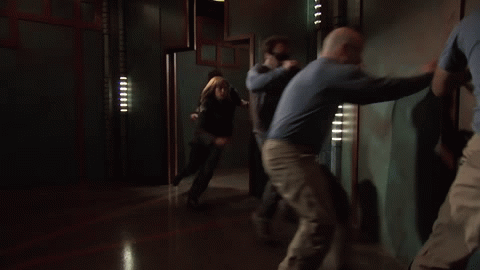
Stargate-Atlantis S5: E10 & 11 First Contact & The Lost Tribe
I've now seen enough SG-1 to be happy to see Daniel Jackson. 😄 I love him and Rodney working together. It's very like Ronon and Teal'c meeting for the first time.
Woolsey: Todd has less baggage with me than you. 🤣🤣🤣
Woolsey leaves Sheppard in command and says: Try not to blow her up while I'm gone. Why would you say that???
I'm always uncomfortable when the teams split up.
Sheppard saying Daniel and Rodney make a good team has to be him poking. He's too good at studying people to not realize they aren't working well together.
Daniel and Rodney are chuckling because they think Sheppard isn't as smart as them, but when things go bad, Sheppard is just as quick as Rodney to put it all together. I also think this is interesting considering Daniel's experience with Jack. Jack is good at what he does, but constantly requests the dumbing down of things and even admits he has no idea how the stargates work. Sheppard seems to generally grasp the science stuff and listens when Rodney is rabid fire explaining. So I think Rodney is giving him a hard time, but I think Daniel actually thinks he's as jockish as Jack, who Daniel loves, but still. It was an interesting moment.
I always thought it sad that Todd thinks Atlantis betrayed him. I mean, he's always coming up with layered plans that are almost betrayals, but it wasn't Atlantis.
I love that Ronon's first thing is arming Keller.
John sends Teyla to safety, not only protecting his people, but I think to command if he dies.
Also, there is a serious lack of Lorne in this episode .
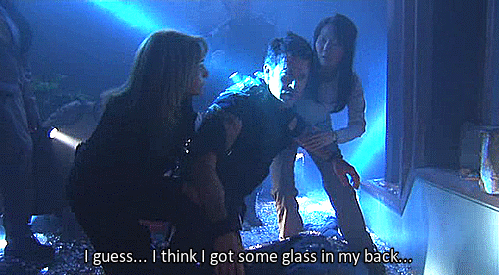
Episode 11: The Lost Tribe
See! It opens with Teyla getting everyone to safely. Sheppard knows what he's about.
Sheppard bodily protects Radek.
Radek: we lost the control room. That is bad.
Teyla: we did not lose you. That's good.
😭😭😭
I love that you can feel the horror of the device through Todd's reaction to it. He's ready to do anything to shut the device down. Anything.
Sheppard leaves with the Travelers and, this time, has a chance to explain why he's leaving Teyla behind. He trusts her to lead Atlantis while he's gone.
When Ronon is shooting up the engine room, I wonder if Keller had a hard time not switching to Kaylee? 🤣
Daniel talking to the Asgard is *spoiler warning* when you watch Atlantis before SG-1.
Todd refuses Sheppard's offer to join forces, tries to manipulate Keller, sets the Deadalus on a collision course, and abandons it. Meanwhile, McKay and Daniel work together. Sheppard joins the Travelers. Ronan retakes the Deadalus. What Atlantis has, that Todd doesn't, that can't be beat, is trust. Trust in each other.
Ronon gets rejected by Keller. I honestly don't think him and Keller made a great pair. He needs a very special sort of woman.
Great two episodes.
Needed some Lorne.
#stargate atlantis#john sheppard#sga#rodney mckay#first contact#the lost tribe#sga s5#currently rewatching#the team#ronon dex#teyla emmagan#richard woolsey#todd the wraith#daniel jackson
28 notes
·
View notes
Text
Aftermath of the 2018 Woolsey Fire in California
Mountain lions are adjusting their behaviour in risky ways to avoid the burn zones after the wildfire. This includes
Crossing major roads more often (and roadkills are already the top cause of death for this population)
Trespassing into one another's territories - for territorial animals, trespassing is a huge risk because a fight may break out between the intruder and the resident puma
Moving more in daytime - unusual for these nocturnal animals and put them at higher risk of meeting humans, although these animals still are taking measures to avoid humans as far as possible e.g. avoiding urban areas
The puma population in California is already small to begin with, and threatened by habitat loss from urban expansion and showing signs of genetic inbreeding. These risky behaviours may further threaten the population, and in the wake of climate change, wildfires in this area may also become increasingly prevalent.
#aslzoology#asl zoology#zoology articles#puma#studyblr#mountain lion#animals#cool animals#zoology#stem#stemblr#nature#wildfires#fires#climate change
17 notes
·
View notes
Text
So, Minecraft time!
I'm playing in my cheaty survival world, and decided to teleport to the nearest Woodland Mansion (that being roughly 9000 blocks away).
I went in, started burning it a little bit from the second floor (as I do when raiding primarily-wooden structures) and after getting several lifetimes worth of Totems, I realized I hadn't even explored the first floor.
It was there I found like eight or so Allays, freeing them and friending them, when I realized that I'd have to guide them back the 9000 blocks I didn't travel. But then, I had an idea.
Teleport every Allay to 0, 70, 0, die (keepinventory gang), then pick them up. However, this also teleported the three Allays I already had (named Bowyer, Archer, and Woolsey) there as well, along with a few Allays I hadn't met from somewhere else in the world. After a long night I carried most of them from the point to my base, then teleported them all back near me (don't ask why I didn't just do this first, I couldn't tell you), and started attaching them to my farms, not to use them, but to make sure they had no chance of going through my Nether Portal (not going through that again).
Anyway, it was on this journey that I learned:
- Although your Sharpness 5 Fire Aspect 2 Netherite Sword won't hurt your Allay, they will still be set on fire, and I really don't know if that hurt them.
- And you can take your item back from an Allay using an empty hand, letting you give them a different one. Not sure how I didn't figure this out before, but it prompted me to finally give Woolsey the block I named him after (he used to have an arrow, like the other two).
So now I have roughly 15 to 20 Allays floating around my base's crop and sheep farms.
These farms aren't automated.
I just brought them for the sake of having little guys.
#minecraft#minecraft allay#allay#allay minecraft#long post#i had some “fun” experiences with an allay in a previous survival world#which informed my decisions on this expedition#also please ignore my casual admission of wanton block game arson
1 note
·
View note
Text
ZevWarden Week 2022
Day 3: Fights and Reconciliation - The Terrible Business of Fighting with your Spouse
Words: 2360 | Rating: General audience | Zevran x f!Tabris
WARNINGS: This bit is about a big argument born out of very silly “I was bent on only considering my point of view”-ness and features a lot of frustration and giving each other the silent treatment. Other things to take into account: one character gets sick, another is disabled with chronic pain, there is a brief mention of the racism against elves in the Dragon Age setting and both characters can be read as having a case of seasonal depression.
I hope you enjoy this one ^^ Happy third day of 2022′s ZevWarden Week!
Read on AO3 or continue under the cut
Astala lifted her head from her book to watch Zevran march past her toward the door that led out of their private quarters at Vigil’s Keep. He ignored her. His expression was still dark with anger and hurt.
“I love you,” Astala called after him, doing her best to make it sound like it always did.
The door shut forcefully with no word of reply.
Well. He was angrier than she thought he was.
Astala sighed and turned back to her book. He’d come around. It was such a stupid argument too, but he had to understand that she couldn’t possibly leave her post right now and go with him to Antiva, warm as it was.
Five minutes later she caught herself staring out the window into the cold, wet and quickly darkening Fereldan afternoon.
Winter had been unexpectedly rough for them last year. Their tempers had shortened in pace with the days and their moods had become dark and damp. Thus they had fought for the first time since Zevran had returned to her side to stay. Presumably. And it seemed this winter, which was only in its first month, would be no better than the last.
When she looked back up from her work, it was pitch black outside. The fire in her study was burning low and the chill of the evening air was starting to creep through the keep’s thick stone walls. Astala heaved herself out of her chair and bit back a groan. Maker damn it to the Void and back, her hip was acting up again. And her cane was leaned against her desk—out of arm’s reach. Astala sighed once again.
Astala sighed again, this time in exasperation, shut her book and returned to her study for an evening of work. It was far better to occupy her mind with the potential construction of a second city wall around the city of Amaranthine than with their quarrel. The city had grown much, was an important trade post, and the darkspawn incursion at the beginning of her tenure as arlessa had shown just how vulnerable it was. And on her pile of reports still lay the letter of yet another bann claiming her policies were seducing all his elven workers away. Really, that this man had managed to keep them in the first place was nothing short of depressing.
-
It took a fair bit of heavy leaning against her chair and stretching her arm as much as she could to retrieve her cane without putting too much pressure on her hip. But she managed. Once she had it, she hobbled to the door and stepped out into the hallway. As she did, cold air enveloped her.
Astala cursed and limped back into her study to fetch the woolen blanket ever positioned on her chair. So armed she made her way to her and Zevran’s quarters, only to slow down until she came to a stop hallway through. She had wanted to talk to Mistress Woolsey about the arling’s finances for over a week now. She had left her study early today. She might manage to catch her before she left for the night.
Astala sighed, turned around and made her way through the dark and cold corridor towards Mistress Woolsey’s study.
Her steps and the clacking of her cane echoed through the empty keep. She didn’t encounter a single living soul on her slow walk. Even the main hall lay silent and empty, the fire in its center reduced to glowing embers. She really had been the only one daft enough to venture outside the smaller, more easily heated rooms. Astala wrapped her blanket tighter around her shoulders and buried her hand in the folds of the fabric to keep it warm. Her right, however, which was holding the cane, had to be left to freeze.
Mistress Woolsey was no longer in her study. Astala didn’t even curse or sigh this time. She sinply turned around and began the slow, painful walk back to her quarters.
She awoke to shifting next to her and turned around to find Zevran climbing into the bed. He froze when he saw her awake. They stared at each other, a sudden tension and awkwardness in the air, until Zevran pulled his shoulders up to his ears in a shiver and crawled under the covers.
When she opened the door, she found the rooms dark and empty. Zevran was still gone. But the fire was still going decently and on the mantelpiece stood a tray with some kind of stew that was still warm. Kind of. Astala warmed it up, ate alone and in silence, left Zevran’s plate closer to the flames and went to bed. The bed was cold and too big for her.
-
“Are you cold, love?” Astala asked quietly.
Zevran shuffled around for a bit, firmly on one side of the bed, before he answered: “I am, yes.”
Astala stretched her arm out towards him. “It’s warmer over here.”
More shuffling on Zevran’s side. Then: “I would prefer to sleep over here tonight.”
Astala lifted her head off her pillow. “You still angry?”
Her husband was turned away from her, curled up, and didn’t say anything.
“Zev, come on.” Astala propped herself up on her elbow. “We can at least huddle together for the sake of warmth. You had the whole afternoon to get over it!”
Zevran stiffened. Then he flung the blankets aside and jumped out of the bed.
“Zevran?”
Astala stared. Then she scrambled after him, or rather tried to. The sudden movement made pain spike through her hip joint and by the time she’d regained her balance Zevran was already out of the door.
“Zevran!” Astala called after him. “Zevran, where’re you going? Zevran, it’s cold!”
A sudden gust of cold air slammed the door shut.
She awoke alone, cold and miserable. Her hip was crying up a storm. Astala grit her teeth, stood up and went about her day.
Astala stood alone in their room and stared after him.
-
No sign of Zevran.
She worked through her ledgers, determined how much money would need to be funneled into the construction of the new city wall and sat down to work out where all that money would come from—an eternal problem that always renewed itself—until her growling stomach and the bells at the keep signaled the lunch hour. Astala stood up and made her way to her and Zevran’s quarters. She hadn’t done her exercises this morning and now she was hobbling around like a grandmother. When she reached their quarters, she discovered that she was once again going to eat alone; Zevran wasn’t there, and the main hall where the Wardens and all of her people ate was too far away for her to walk there. Astala decided then and there that the day couldn’t get worse.
In the midafternoon the pain in her hip had gotten so bad that she couldn’t focus on her work. Astala sat her paperwork aside and let herself cry for a short while, then pulled herself up and asked the first person that crossed her way to help her get to the keep’s physician. There at least she’d get something for the pain.
It was at the physician’s office, which had been Ander’s once and lay across the courtyard, where she found Zevran.
He was sitting on a couch. Just sitting there, as if he hadn’t disappeared the whole day and had left her to wake up alone and eat alone and- Before she knew it, anger was already running out of her moth, along with words.
“Where were you?”
And Zevran felt the anger. He had a sixth sense for it.
“Away.”
“No fucking shit,” Astala snapped. “What were you thinking, running away like that? You know perfectly well I can’t follow you!”
He clenched his jaw and looked somewhere else.
“That was rather the point, was it not?” he said quietly. “Some alone time to get over myself.”
“I didn’t say that!” Astala protested.
Zevran finally looked at her, accusingly so, and raised an eyebrow.
For a moment, they sat and waited in icy silence.
“Why are you here?” Astala finally asked.
As if on cue, Zevran sneezed.
“A cold.”
Astala huffed. “I told you to come to the warm side of the bed.”
“You know where it would be even warmer?” Zevran snapped. “In Antiva.”
“This again?” Astala leaned against the wall and crossed her arms. “How many times do I have to tell you? I can’t just go to Antiva. I have work to do here!”
“You could work just as well and much better from Antiva,” Zevran answered.
Astala scoffed.
“Stop doing that!”
Suddenly, Zevran was on his feet, staring at her with anger and frustration in his eyes.
“You said yourself that you hate the winter here. Yet when I come with a solution all you have to give is- is this?” He imitated her scoff.
“Zevran,” Astala said, in a dangerously calm tone, “I would love to go to Antiva. But, like I already told you, I cannot go. What is it about that that you don’t understand?”
Zevran shut his mouth and abruptly turned away from her.
“And don’t you dare end this conversation by running away again.”
“I was not planning to,” Zevran hissed, sat down where she had found him and crossed his arms.
Astala sat down on a chair on the opposite side of the room. Silence descended over them once more. The pain in her hip was now making it difficult to sit, and she turned this side and that in search for a position that might ease the pressure. She shouldn’t have bothered. She found none.
“Does it hurt?” Zevran asked quietly.
Astala looked up at him, surprised, then nodded and found tears in her eyes.
Zevran sighed and stood up.
“Lie down,” he told her. “I will take the chair.”
When the physician arrived, Zevran got something for the cold and Astala got something for her pain. Zevran then walked her back to the keep again before he disappeared. Astala found herself walking towards their chambers. Which was fine. She wouldn’t do much more today anyhow. She did her exercises, set some water on the stove in case Zevran came back and was cold, and crawled into bed.
Astala accepted it with a quiet ‘thank you’. Zevran even helped her lie down, and she could’ve cried of relief as the pressure on her hip eased. Zevran took the chair she had previously occupied, and they resumed their silent wait for the physician. Outside, it was already dark. In the light of the lantern at the physician’s door, Astala could see heavy snowfall.
-
Once again, she woke up in the middle of the night as Zevran crawled into bed.
“Sleep, my Warden,” he said quietly.
“`M already awake,” Astala muttered and sat up.
She hadn’t closed the blinds, dark as it had been, but now the clouds had disappeared, and the almost full Luna, the bigger one of the two moons, shone brightly on the freshly fallen snow. Inside their room, it was chilly save in the fireplace or under the blankets. She should close the blinds. It would keep more warmth inside. Next to her, Zevran sneezed. He had a very peculiar way of sneezing, quiet like nobody else she’d heard. He cast a cautious glance in her direction and saw her looking at him.
“Perhaps I should sleep someplace else so you don’t catch it as well, no?” he offered.
“No!” Astala would have been shocked at how raw her voice sounded if she wasn’t so intent on having him stay. “No, please, I- I don’t care about the cold.”
Zevran’s gaze softened. “That does not sound like the wife I know.”
“I’m sorry,” Astala whispered. “I’m sorry.”
Zevran sighed, propped up his pillow against the headboard and leaned back.
“Zevran, I’m so sorry,” Astala repeated. “I shouldn’t have said those things and least of all like that.”
“I am sorry as well,” Zevran said, gaze lowered to his hands. “You were in pain.”
“I was a bitch.”
“Now, now.” Zevran tutted at her. “Why do you insult my wife so?”
Astala laughed despite herself, and that laugh untethered the tears she had been holding in. Now she was sniffing alongside with Zevran, which made her laugh again and feel terribly ridiculous.
Zevran carefully shuffled closer and laid his head on her shoulder. Astala wrapped one arm around him and pressed her nose into his hair. She felt the tension melt out of his shoulders. It was the best thing that had happened in the last few days.
“Did you miss me?” he asked quietly.
Astala nodded into his hair.
“I did as well,” Zevran said. “Fighting is such terrible business.”
Again, Astala nodded.
“Maybe we should fight more often!” Zevran said with all the sudden enthusiasm of someone who’s had a grand idea. “Small disagreements every second day for breakfast and one big fight every month. We could even add weapons or a point system to make it more fun! What do you say?”
For some reason, this made Astala cry harder. Zevran sat up in alarm.
“Amore? Was that the wrong thing to say?”
Astala laughed, still crying, and cupped his face with her hands.
“You are ridiculous,” she managed. “Ridiculously awesome.”
“Only for you,” Zevran said as relief chased over his face.
Tentatively, he placed a kiss on her hand, and then pulled her into a hug. Astala buried her face in the crook of his neck and clung to him, only now becoming aware of the weight these past days had settled on her as it slowly dissolved and melted away.
Maybe a few days off would do them good. Or a few weeks.
“Zevran?”
“Hmmm?”
Astala further hid her face in his shirt and had to give herself a mental shove to speak on.
“How long is it to Antiva?”
Zevran had been idly drawing his finger over the nape of her neck. It stopped.
“A week or two of travel by ship, depending on the weather. Why?”
Astala bit her lower lip. “Will you get very angry at me if I tell you that… that maybe we should go? Just for a bit?”
Zevran held still. Astala was already fearing for the worst when he gently untangled himself from her to look her in the eye.
“You are a stubborn one at times, my Warden,” he said with a sigh and a shake of his head.
His gaze, however, held fondness.
“I’m sorry,” Astala whispered.
“Hmm, no, no, enough apologizing, I think,” Zevran said and laughed. “We are going to Antiva, then? Shall we pack and set out in the morning?”
The rest of her worries rumbled off her chest like stones off the mountainside and Astala laughed as well.
“Let me settle some things with Mistress Woolsey,” she said and pressed a kiss into his skin. “And then we can pack.”
“That is good enough for me,” Zevran said. A wide smile was slowly stretching over his face. “We are going to Antiva!”
A spark of excitement settled in her chest as well. Last winter had been rough. Maybe Antiva would help them be kinder to each other.
#zevwarden week 2022#zevwarden#fanfic#fights and reconciliation#zevran x f!warden#zevran x tabris#fantasy racism#hurt-comfort#emotional hurt/comfort#winter#seasonal affective disorder#disabled character#chronic pain#chronic injury#silent treatment#arguing#seasonal depression
14 notes
·
View notes
Text
The Fic Masterlist
House of the She-Dragon - https://archiveofourown.org/series/3831154
FANDOM: House of the Dragon, a Song of Ice and Fire
PLOT: An AU where Aemma had three daughters, which changes the course of House Targaryan.
FEATURING: two Targaryan OCs, original kids, Daemon being a creep, gay, dragons.
SHIPS: Rhaenyra Targaryan/Alicent Hightower, Harwin Strong/Aelora "Ellie" Targaryan (OC), Laenor Velaryon/Joffrey Lonmouth, Rhaenys Targaryan/Corlys Velaryon, Laena Velaryon/Qoren Martell,
Book 1 - The Last Great Targaryan Dynasty - COMPLETE
Book 2 - The Sword and the Flame - On Going
The Planets and The Fates - https://archiveofourown.org/series/4102894
FANDOM: Stargate, Stargate SG1, Stargate Atlantis
PLOT: When the original Elizabeth Weir went back in time and met Janus, he decided to be a little more proactive in making sure the expedition gets off the ground. Multiple times.
FEATURING: time travel, teaching aliens about Easter, military based gay angst, character exploration, friendship, found family, Sam's reproductive organs speech, all kinds of angst, hurt/comfort, chaos.
SHIPS (subject to change): Daniel Jackson/Sha're, Elizabeth Weir/Samantha Carter, Teal'c/Dray'ac, Jolinar|Rysa/Lantash|Martouf, Samantha Carter/Lantash|Martouf, Samantha Carter/dead boyfriends, John Sheppard/Elizabeth Weir, John Sheppard/Teyla Emmargan, John Sheppard/Rodney McKay, Samantha Carter/Jack O’Neill, Elizabeth Weir/Jack O’Neill, Elizabeth Weir/Samantha Carter/Jack O’Neill, Ronon Dex/Jennifer Keller, Richard Woolsey/Vala Mal Doran, Teal’c/Ista
Book 1 - And All The Stars Aligned - On Going
The Star Stable Rewrite - Unpublished
FANDOM: Star Stable Online, Star Stable, Starshine Legacy
PLOT: the story of the people who fought Garnok for the final time (or is it?)
FEATURING: all the headcanons, thirsting, multiple OCs, horses, Sky rages at SSO.
SHIPS: Emily Catnight (MC)/Linda Chandra, Elizabeth Sunbeam/Avalon/Larissa Youngblood (MC), Kara Winter (MC)/Sabine, Elizabeth Sunbeam/Sabine, Alex Cloudmill/Maya Dew
The Great Alliance - Unpublished
FANDOM: Fallout, Fallout 4
PLOT: a dysfunctional family are frozen together, but will they save the Commonwealth together?
FEATURING: big screwed up family, all the factions
SHIPS: undecided
#star stable online#sso#stargate#stargate sg1#stargate atlantis#fallout#fallout 4#house of the dragon#game of thrones#a song of ice and fire#fan fiction
0 notes
Text
What Are The Main Characters Up To
These are all the goofy things I’ve decided are canon now because I am god. Heads up, these are my unedited notes so they’re unhinged kinda.
Atlantis Personnel
• Command: Woolsey
• Military Command: Sheppard
• Everyone I like hehe
Weir
• Stepped down from command in favor of science sg team
○ Only stepped down originally because Sam was taking over but whatever I guess
• Enjoys her scientific stuff none the less
• Atlantis 2
○ Personnel
▪ Weir
▪ Jonas Quinn
▪ Aiden Ford
▪ Radek Zelenka
▪ Often accompanied by IT and Security + other sci support
○ Focus on second contact and scientific/archaeological interest
○ Establishing Scientific Outposts
Daniel
• Handling of new personnel
• Heads up training
○ Getting new personnel up to speed on Stargate history
○ Highlighting key mission reports
○ Going over Warith and Goa'uld threats
• Professional MacKenzie Wrangler
• Accompanies new personnel on Daedalus
○ Usually with the ulterior motive to explore the city
○ But officially its so he can put out last-minute fires and act as a liaison for three weeks before new personnel are fully alone in Atlantis
• Still on SG-1 except for training sessions (roughly three months per year)
Vala
• Still on SG-1 full time
• Accompanies Daniel on Daedalus because Its An Outing
• Handles some training but not much
• She and Daniel are dating and play a role in Cassandra's life
• Certified MacKenzie Enabler
Jack
• Threatens to retire every year
• Acts as a head hunter in rare occasions for new personnel
• Spends his time off going fishing and visiting Randy and Liza
○ Randy is convincing him to go for vocational rehab in astronomy
○ Spends holidays with the MacKenzies, as does the rest of OG Sg1
• Certified MacKenzie Enabler
Teal'c
• Finally he has been given an earth identity and gets to live out in the world
• Considering retirement but not sure
• Working on getting his family and Bra'tac to earth
• Also considering going to Atlantis
• Handles a lot of Goa'uld related training for new personnel
Sam
• Heads up an SG Team
• Does training
• Occasionally teaches at the air force academy
• Considering taking the offer to go to Atlantis so she can have fun in a new galaxy hell yeah hell yeah!!!!
Also because the MacKenzies are hellions and she is a certified MacKenzie Wrangler
0 notes
Text
“This Is A Date With Disaster”: Net-Zero Is Pulling The Plug on America’s Electrical ‘Life Support System,’ New Documentary Says
COGwriter
A reader tipped me off to the following:
“This Is A Date With Disaster”: Net-Zero Is Pulling The Plug on America’s Electrical ‘Life Support System,’ New Documentary Says
February 13, 2024
Electricity is among the most essential sources of America’s unparalleled prosperity and productivity; it is also the greatest vulnerability.
The United States has become so utterly dependent upon an uninterrupted supply of affordable electricity that, as our grid becomes ever more fragile American society has become fragile along with it.
Former CIA director James Woolsey testified before the U.S. Senate in 2015 that, if America’s electric grid were to go down for an extended period, such as one year, “there are essentially two estimates on how many people would die from hunger, from starvation, from lack of water, and from social disruption.
“One estimate is that within a year or so, two-thirds of the United States population would die,” Mr. Woolsey said. “The other estimate is that within a year or so, 90 percent of the U.S. population would die.”
Chris Keefer, president of Canadians for Nuclear Energy, concurred.
“The energy grid is a civilizational life support system, and without it, modern society collapses very quickly,” he said.
Mr. Keefer is one of the experts featured in energy analyst, author, and documentarian Robert Bryce’s new film, “Juice: Power, Politics and the Grid.” This five-part docuseries looks at how and why America is now “fragilizing” and destabilizing the engineering marvel that is the central pillar of our society.
“We are seeing the grid’s reliability, resilience, and affordability all declining,” Mr. Bryce told The Epoch Times. “We wanted to get people and policy makers to understand that our most important energy network is being fragilized, and we ignore this danger at our peril,” Mr. Bryce said. https://www.zerohedge.com/energy/date-disaster-net-zero-pulling-plug-americas-electrical-life-support-system-new-documentary
There are two main ways some believe that a major type of electrical disruption could happen.
One is sunspot-related activities.
The other is with a devastating EMP (electromagentic pulse) bomb:
February 3, 2023
EMP experts have warned that China, North Korea, Russia, and Iran have programs to hit the U.S. grid with electromagnetic pulse weapons that would cut the cord for a year or longer. A congressional report has warned that a blackout that long could result in millions of deaths. https://www.washingtonexaminer.com/news/washington-secrets/1376891/dry-run-balloons-called-top-delivery-platform-for-nuclear-emp-attack/
With the current situation with the USA taking strikes against Iranian allies/proxies, Iran may decide to try to use some type of EMP weapon.
Furthermore, notice the following from a couple of years ago:
Iran Could Soon Strike US With EMP Weapon
June 2, 2021
Does Iran already have nuclear weapons and the capability to make an electromagnetic pulse attack that would destroy electric grids and critical infrastructures sustaining the lives of 330 million Americans?
Not everyone agrees with Washington’s intelligence community “consensus” that Iran does not yet have nuclear missiles. https://www.newsmax.com/platinum/iran-us-emp-nuclear/2021/06/02/id/1023561/
U.S. military warns electromagnetic pulse weapons in Iran, Russia and North Korea could melt down nuclear power plants, shut down the electricity grid for 18 months and WIPE OUT millions of Americans
An Air Force report reveals the U.S. is utterly unprepared for an electromagnetic pulse weapon attack Iran, North Korea, Russia, and U.S. all have developed EMP weapons that fire invisible microwaves and electromagnetic pulses that shut down electricityThe report warns that an attack could shut down the electricity grid for 18 months, would melt down nuclear plants, and displace 4.1million peopleIt would also kill 90 per cent of the East Coast within a yearNo electricity would affect transportation, food distribution, and healthcare 12/01/18 https://www.dailymail.co.uk/news/article-6449619/Air-Force-warns-electromagnetic-pulse-weapons-Iran-Russia-North-Korea-destroy-America.html?fbclid=IwAR20sUtYtx7dPe09X-rbxJtAbEqC35-peYUBLi74Y6E_PmcU1f17vYl-7Fg
The USA is vulnerable to electromagnetic issues, either from natural causes or man-made ones.
A power grid failure, including one caused by an EMP (ElectroMagnetic Pulse) weapon, could be a factor in the troubles that hit prior to the start of the Great Tribulation.
A while back, the Continuing Church of Godput out the following video on our Bible News Prophecy YouTube channel:
youtube
17:43
Electrical End of the USA ?
Could problems with the electrical power grid caused by one or more electro-magnetic pulse bombs, solar flares, and/or other phenomena help weaken the USA to the point of allowing it to be taken over? Does such potential exist? If so, is this consistent with any biblical prophecies? What are some of the severe consequences that the USA would face in the event of an electrical power grid failure? Is there evidence in scripture that the USA will be taken over in the 21st century?
Here is a link to our video: Electrical End of the USA?
The USA faces a massive threat from many things that could knock-out its electrical power grid. The USA itself has been developing its own cyber-warfare and EMP technologies, which, of course, also encourages other nations to do so. Plus, the USA is likely to share that technology with Europe.
Jesus taught of a time of “troubles” that would come in Mark 13:
7 But when you hear of wars and rumors of wars, do not be troubled; for such things must happen, but the end is not yet. 8 For nation will rise against nation, and kingdom against kingdom. And there will be earthquakes in various places, and there will be famines and troubles. These are the beginnings of sorrows. (Mark 13:7-8)
While most in the USA act like it will go on indefinitely and cannot truly be brought down, the reality is that electrical, weather, pestilence, and other events can devastate the USA.
Consider that in the end times, the Bible tells of a King of the North (Daniel 11:29-45), King of the South (Daniel 11:40-43), and the Kings of the East (Revelation 16:12-16), but no King of the West?
Instead it tells of a time when the power with the strongest fortresses gets taken over by the King of the North (the “he” in the following scriptures):
39 Thus he shall act against the strongest fortresses with a foreign god, which he shall acknowledge, and advance its glory; and he shall cause them to rule over many, and divide the land for gain. (Daniel 11:39)
25 “Through his cunning
He shall cause deceit to prosper under his rule;
And he shall exalt himself in his heart.
He shall destroy many in their prosperity. (Daniel 8:25)
This will cause the world to marvel (Revelation 13:3-4).
It is likely that the USA will have to be in a weakened state to be taken over. And while deceit will be a factor (Daniel 8:25; Lamentations 1:1-2), the fact is that the USA will be hit with troubles and sorrows, beforehand (Matthew 24:4-8) that will weaken it.
Notice the following from our free online book, Lost Tribes and Prophecies: What will happen to Australia, the British Isles, Canada, Europe, New Zealand and the United States of America?:
The Bible warns that God will “hurl disasters” against some descended from Israel (Deuteronomy 32:23, NJB) who “provoke” God (Deuteronomy 32:21-22, NKJV). Disasters, especially if there is an ElectroMagnetic Pulse (EMP) attack, a severe solar flare storm, devastating hurricane (s) something like a massive volcanic eruption and/or massive earthquake could be part of a so-called “perfect storm” of events that could set up the U.S.A. for destruction. …
It looks like Germany’s FAIR, along with the LHC and other technology like the stellarator, will help the Europeans produce military weaponry to fulfill certain end-time prophecies. Since Revelation 13:4 is discussing what seems to be a unique type of warfare, this warfare likely includes certain high-tech weapons (such as electromagnetic pulse, neutron bombs, unique delivery systems, etc.) that will be effective for a while.
The USA is highly dependent upon electricity and its power grid is at risk. As far as Europe attacking the USA, the Bible points to the “friends” of the USA becoming enemies (cf. Lamentations 1:1-2).
That said, according to various reports, an EMP attack could happen tomorrow–though I do NOT expect one from Europe for at least 3 1/2 years. But Iran or others could do something soon.
Are you ready spiritually to deal with what can happen in the USA? Even if you do not live in the USA, consider how its devastation could affect you and the country you are currently living in.
Related Items:
Electrical End of the USA? Could problems with the electrical power grid caused by one or more electo-magnetic pulse bombs, solar flares, and/or other phenomena help weaken the USA to the point of allowing it to be taken over? Does such potential exist? If so, is this consistent with any biblical prophecies? What are some of the severe consequences that the USA would face in the event of a electrical power grid failure? Is there evidence in scripture that the USA will be taken over in the 21st century? Dr. Thiel addresses these issues and more in this video.
Might the U.S.A. Be Gone in 2028? Could the USA be gone by the end of 2028 or earlier? There is a tradition attributed to the Hebrew prophet Elijah that humanity had 6,000 years to live before being replaced by God’s Kingdom. There are scriptures, writings in the Talmud, early Christian teachings that support this. Also, even certain Hindu writings support it. Here is a link to a related video: Is the USA prophesied to be destroyed by 2028? In Spanish: Seran los Estados Unidos Destruidos en el 2028?
Is God Calling You? This booklet discusses topics including calling, election, and selection. If God is calling you, how will you respond? Here is are links to related sermons: Christian Election: Is God Calling YOU? and Predestination and Your Selection; here is a message in Spanish: Me Está Llamando Dios Hoy? A short animation is also available: Is God Calling You?
Christian Repentance Do you know what repentance is? Is it really necessary for salvation? Two related sermons about this are also available: Real Repentance and Real Christian Repentance.
Lost Tribes and Prophecies: What will happen to Australia, the British Isles, Canada, Europe, New Zealand and the United States of America? Where did those people come from? Can you totally rely on DNA? Do you really know what will happen to Europe and the English-speaking peoples? What about the peoples of Africa, Asia, South America, and the islands? This free online book provides scriptural, scientific, historical references, and commentary to address those matters. Here are links to related sermons: Lost tribes, the Bible, and DNA; Lost tribes, prophecies, and identifications; 11 Tribes, 144,000, and Multitudes; Israel, Jeremiah, Tea Tephi, and British Royalty; Gentile European Beast; Royal Succession, Samaria, and Prophecies; Asia, Islands, Latin America, Africa, and Armageddon; When Will the End of the Age Come?; Rise of the Prophesied King of the North; Christian Persecution from the Beast; WWIII and the Coming New World Order; and Woes, WWIV, and the Good News of the Kingdom of God.
LATEST NEWS REPORTS
LATEST BIBLE PROPHECY INTERVIEWS
0 notes
Text
Could the Deadliest Wildfire in U.S. History Become the New Norm? “We Now Have Mass-Fatality Wildfires—Specifically Civilian Fatalities."
— By Allison Eck | Published: Friday November 16, 2018 | Friday December 08, 2023
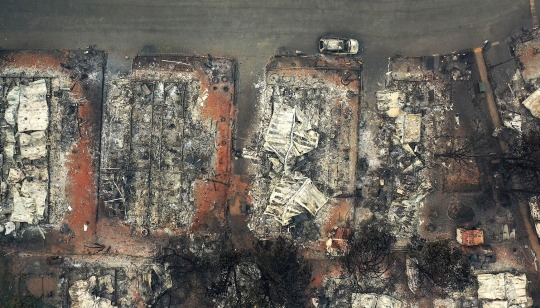
An Aerial View of a Neighborhood Destroyed by the Camp Fire on November 15, 2018 in Paradise, California. Photo credit: Justin Sullivan/Getty Images
This week, the death toll of California’s “Camp” and “Woolsey” wildfires rose to at least 66; swift and furious flames in the Northern and Southern regions of the state have destroyed more than 200,000 acres. Camp Fire alone has forced at least 52,000 people to evacuate the town of Paradise and the surrounding Butte County—and more than 600 people are still missing.
By this past Sunday night, Camp Fire had become the deadliest single wildfire in California’s history.
That tragic distinction signifies a new era, according to Crystal A. Kolden, an associate professor in the Forest, Rangeland, and Fire Sciences department in the College of Natural Resources at the University of Idaho.
“We now have mass-fatality wildfires—specifically civilian fatalities,” she said, noting that this is a recent trend. Prior to about two years ago, most wildfires in the U.S., except for a few outliers, didn’t kill civilians. And the fires were smaller, too—a fire that burned tens of thousands of acres was considered huge. Now, seething scorchers in the West zip through parched shrubbery at 80 acres per minute, often near what is called the urban-wildland interface: regions close to forests where people make their homes.
The fact that most fires in the U.S. have been destructive but not deadly is both a Catch-22 and a sign that a well-intentioned but ill-fated (at least in many regions) strategy called fire suppression has worked… temporarily. Although fewer people died in the past, the United States’ history of putting out fires has permitted additional plant growth—flammable material that we didn’t allow to burn and is now vulnerable to catching fire en masse. That means bad news for fires that occur today, particularly since climate change now figures into the picture—and because little thought was ever put into wildfire death prevention.
“For most natural hazards in the U.S., we’ve actually done a really great job reducing fatalities through planning, predicting, developing warning systems, and improving our infrastructure,” Kolden said. “We haven’t done that for wildfires because we haven’t had a lot of fatalities.”
Now that wildfires are becoming worse due to a confluence of factors, Kolden says scientists are trying to figure out what the sweet spot is when it comes to controlled (a.k.a. prescribed) burns: intentional manmade wildfires that help reduce the intensity of future fires by limiting the accumulation of flammable fuels.
“Prescribed fire is used for two different purposes,” she said. “The first purpose is to reduce the amount of brush and the amount of fuel that’s available for the fire in the understory [beneath the forest canopy]. The other purpose is that it reintroduces fire in places where fire burned frequently historically.”
Scientists know from tree ring records that certain regions experienced wildfires as often as every three to five years; taking out understory brush removed competition for water and nutrients among the bigger trees. Today, these areas are not used to combustion-less living. In other words, the land misses the fire.
As much as 20 to 30 million acres a year used to burn prior to the West Coast European settlement period. “If you look at the Lewis and Clark journals, there’s an enormous amount of discussion about how smoky the air is,” Kolden said. This is no longer the case—but perhaps more important is the particular pattern that’s been lost. Frequent fires allowed for a patchwork quilt of landscape ages to materialize, since fires would come up against recently scalded land and stop. Now we have a lot of old brush and a lot of new brush—but not a lot of in-between brush. “That sort of homogeneity in the lack of a patchwork is really problematic for an ecosystem,” Kolden explained.
While the expected role of forest management agencies in helping resurrect a foregone period is contentious and misunderstood, Kolden says that one thing they can do is thin out smaller vegetation and underbrush to allow large trees to get bigger and better-spaced again.
“Unfortunately, that’s not very profitable,” she noted. “It costs more to do that type of work than they will make for the value for the timber.”
Ultimately, the sheer force of these climate-change-buffered fires is wreaking immediate havoc on old, under-prepared communities. And though many modern homes were built under more stringent fire codes, older homes literally become fuel for the flames. “They’re the primary fuel, not the forest itself,” Kolden said. What makes matters worse is that many of the people who live in these old, urban-wetland interface homes were priced out of more expensive urban regions. They can’t afford the necessary fireproof updates to their homes.
It’s a vicious cycle that has few escape routes, either locally or globally. In Slate, Stephen Pyne, a professor in the School of Life Sciences at Arizona State University specializing in the history of fire, writes, “We used to think fire history was a subset of climate history; now climate history is becoming a subset of fire history.” Kolden explains that, from a science perspective, this is what’s known as a positive feedback loop: “As we have ignitions from fires going into the atmosphere, it alters the climatic system. As it alters, it promotes [the atmosphere] generally toward warming, which promotes more fire.” At a broader level, what we’re seeing in the changing climate is, according to Pyne, a mere symptom of what he calls the “Pyrocene,” or the era in which humans have fundamentally altered how things burn on Earth.
"Our fire history used to be about finding new stuff to burn," Pyne told NOVA. "Now, it’s more about dealing with the effluent of all that burning."
The Pyrocene didn’t necessarily start when fire suppression began, but the practice was certainly a turning point. “At the end of the 19th and the early part of the 20th century,” before fire suppression methods took hold, Kolden said, “people did die in wildfires—by the thousands.” Fewer people died once fire suppression techniques gained popularity, but now we’re looking at a return to the past because of it.
“We are moving back toward that if we don’t change the way we approach wildfires.”
— Editor's Note: This article was updated on November 17 to include a direct quote from Stephen Pyne.
0 notes
